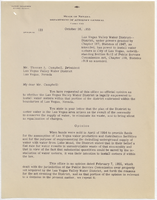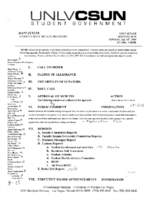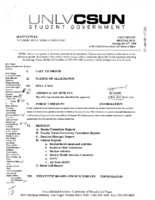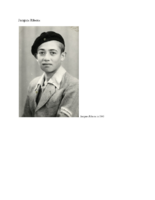Search the Special Collections and Archives Portal
Search Results
Jay C. Sarno Jr. oral history interview
Identifier
Abstract
Oral history interview with Jay C. Sarno Jr. conducted by David G. Schwartz on July 10, 2008 for the Remembering Jay Sarno Oral History Project. Sarno begins by discussing how his parents met in the early 1950s in Miami, Florida and were married within six weeks. Sarno then describes his family moving to Las Vegas, Nevada in 1965 and living in the Dunes Hotel for the first three weeks. Sarno then chronicles his parents’ marriage and their divorce in the 1970s. Sarno then recounts his father’s relationship with Jimmy Hoffa and Allen Dorfman and the visits Hoffa made to Las Vegas to see his father. Sarno talks about the way his father treated him and his brother differently than his sisters. Lastly, Sarno discusses how he and his siblings were surprised their father owed the Internal Revenue Service over one million dollars at the time of his death.
Archival Collection
Charles A. Hendel Notebook
Identifier
Abstract
The Charles A. Hendel Notebook is comprised of one notebook of poetry and prose written by Charlie Hendel between 1960 and 1976. Topics include the state of Nevada, World War II, American nationalism, and biographical materials about Charles Hendel.
Archival Collection
Kirsten Searer (Nevada Public Education Foundation) oral history interview conducted by Magdalena Martinez and Taylor Cummings: transcript
Date
Archival Collection
Description
From the Lincy Institute "Perspectives from the COVID-19 Pandemic" Oral History Project (MS-01178) -- Education sector interviews file.
Text

Cristina Alano oral history interview: transcript
Date
Archival Collection
Description
Oral history interview with Cristina Alano conducted by Cecilia Winchell and Stefani Evans on September 9, 2022 for the Reflections: The Las Vegas Asian American and Pacific Islander Oral History Project. In this interview, Alano recalls a happy childhood in Pampanga, Philippines. After attending college for a banking and finance degree, she briefly worked at a bank before marrying her husband and immigrating to the United States. She would go on to move to Colorado where she lived for seven years, and finally moving to Las Vegas, Nevada in 2003. Alano recalls her first jobs in Las Vegas, including Walmart, SEI Electronics, a cashier at the Riviera, and finally the airport where works as a supervisor at Hudson as well as an assistant manager at Brighton. She discusses what she has done at each job and how she ended up getting involved with the Culinary Union in 2016. Since joining the union, she has done everything from being a shop steward to canvassing, most recently flying down to Georgia to help campaign for Senator Warnock. Throughout the rest of the interview, she discusses everything from food, to festivals, and her family.
Text
MacDonald Ranch Development Records
Identifier
Abstract
The MacDonald Ranch Development Records (1972-2010) contain correspondence, maps, land assessments and investigations, master plans, and architectural, civil engineering, and landscape drawings primarily detailing the community development process of MacDonald Ranch, a master-planned community in southwest Henderson, Nevada.
Archival Collection

Fernando Romero oral history interview: transcript
Date
Archival Collection
Description
Oral history interview with Fernando Romero conducted by Laurents Bañuelos-Benitez on October 2, 2018 for the Latinx Voices of Southern Nevada Oral History Project. Barbara Tabach also participates in the questioning. Fernando Romero was born in El Paso, Texas in a musical home. His father and brother were avid music players, and his brother left El Paso to play in orchestra in Las Vegas. Despite not being as passionate about music as the rest of his family, music was Romero's ticket to higher education. Romero attended University of Nevada South before it was renamed University of Nevada Las Vegas. Romero has gone on to be deeply involved in the Las Vegas community. He is the current president of Hispanics in Politics. Subjects discussed in this interview include: Hispanics in Politics, Nevada Association of Latin Americans, and education.
Text

Letter including Nevada Attorney General Opinion No. 123 from Harvey Dickerson to Thomas A. Campbell (Las Vegas), October 26, 1955
Date
Archival Collection
Description
Notwithstanding Section 6112 of the Public Service Commission Act, the Las Vegas Valley Water District was allowed to meter water to customers; Opinion No. 123.
Text

Meeting minutes for Consolidated Student Senate, University of Nevada, Las Vegas, July 14, 2008
Date
Archival Collection
Description
Text

Meeting minutes for Consolidated Student Senate, University of Nevada, Las Vegas, October 13, 2008
Date
Archival Collection
Description
Text

Biographical essay by Jacques Ribons, 2014
Date
Archival Collection
Description
Jacques Ribons describes his life during the Nazi occupation of Poland. During the liquidation of the Jewish ghetto, his family decided to turn themselves in to the Germans. They were sent to a prison and separated. He and his brother survived and went to France with the OSE, and came to the United States in 1947.
Text
